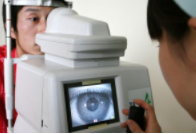AI will help optometry clinical decision making and improve care stability
The health care industry is actively seeking to use cognitive (cogniTIve) solutions to improve patient care quality and treatment outcomes. Deep learning techniques have proven to be extremely helpful in improving medical services. The increasing popularity of artificial intelligence (AI) will help optometrists and ophthalmologists make clinical decisions, reduce medical errors, and improve the stability of patient care.
According to reports, although ophthalmology is still attached to telemedicine and online optometry, AI and robots will have a major impact on the world of the 21st century. The health care industry must not only embrace technology innovation, but also must be objective in assessing and adopting AI. AI must be able to substantially improve the current care for patients in order to successfully develop in the eye care industry.

415 million people worldwide are affected by diabetes, and making good use of AI can help reduce the chance of blindness. The Harker School in San Jose, California, and the Byers Eye InsTItute from Stanford University School of Medicine collaborated on data-driven and deep learning algorithms to independently evaluate and develop a fully data-driven AI diagnostic tool to test and classify diabetic retinopathy. It can analyze the identified cases and the fundus images of diabetic patients for medical referral.
JAMA (Journal of the American Medical AssociaTIon) published a paper on the use of AI to diagnose diabetic retinopathy in November 2016. In addition, at the ARVO conference in Baltimore, USA in 2017, surgeons demonstrated the first successful use of a remote-controlled robotic system in human retinal surgery.
This was a randomized clinical trial in which 6 patients underwent conventional surgery and 6 patients underwent surgery using a robotic system. The results showed that robotic system-assisted surgery had a lower incidence of retinal microbleeds.
Researchers are also evaluating the value of deep learning in the development of glaucoma. Glaucoma development analysis software is often used in the optometry room. Heidelberg Engineering's Spectralis, Topcon's Synergy and Zeiss's Forum software can monitor the progress of glaucoma, help to change and improve the care of glaucoma patients, and optometry for AI and robots. The application provides a preliminary and profound perspective.
VisulyTIx has developed the retinal AI platform Pegasus, which can self-screen glaucoma by evaluating the optic disc and also to grade the extent of diabetic retinopathy.
CCTV Products,CCTV Parts, Video Surveillance Accessories, CCTV Camera Accessories
Chinasky Electronics Co., Ltd. , https://www.cctv-products.com